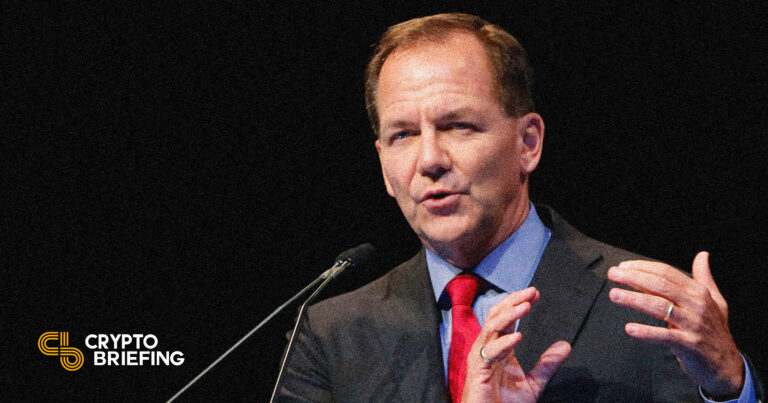Key Takeaways
- Paul Tudor Jones has said that Bitcoin and Ethereum could benefit from rising inflation and weak macroeconomic conditions due to their scarcity.
- He argued that the U.S. economy is either in or heading for a recession, and that markets could rally if the Federal Reserve stops hiking interest rates to combat inflation.
- Stanley Druckenmiller shared similar views to Jones last month, pointing out that economic turmoil could highlight crypto’s value.
Share this article
Paul Tudor Jones said that he believes the U.S. economy is either in or on the cusp of a recession.
Jones Thinks Recession Is Looming
Despite a months-long bear market that’s dragged Bitcoin and Ethereum 70% down from their highs, Paul Tudor Jones has made it clear that he thinks the top two crypto assets could soar in a post-recession world.
The billionaire hedge fund manager discussed crypto’s place in the current macroeconomic landscape in a Monday interview with CNBC’s Squawk Box, saying he thought the nascent asset class could see significant growth in the future.
Jones shared his thoughts on the current state of the global economy, noting that he believed the U.S. was headed for a recession if it wasn’t already in one. “I would think we’re probably getting ready to go through the recession playbook,” he said, predicting that the 2020s would be defined by a “focus on debt dynamics,” fiscal deficits, and policy “that gives people confidence in the long run value of a currency.”
Jones said that he thought central banks had engaged in “massive experimentation” in the years since the Global Financial Crisis, arguing that suppressed yields and pandemic relief packages were products of monetary and fiscal experimentation.
Reflecting on the digital assets space, Jones pointed to high inflation rates as a potential catalyst for a crypto surge. “In a time when there’s too much money, which is why we have inflation, and too much fiscal spending, something like crypto—specifically Bitcoin and Ethereum—where there’s a finite amount of that, that will have value at some point,” he said.
When CNBC’s Andrew Ross Sorkin asked whether crypto would have a “much higher” value than today, Jones said “I think so, yeah,” but admitted that he didn’t know when prices would rise.
Jones also commented on the Federal Reserve’s economic tightening policy, which has seen the U.S. central bank hike interest rates by 75 basis points on three occasions this year. The Fed has forecast a peak funds rate of 4.6% in 2023, raising economists’ expectations of further hikes before the end of the year. The current funds rate is 3% to 3.25%.
As others have predicted, Jones said that a pivot in the Fed’s hawkish stance could lead to a surge across global markets. “When [a pivot] happens you’ll probably have a massive rally in a variety of beaten-down inflation trades, including crypto,” he said. Jones also revealed that he still holds an allocation in Bitcoin, having repeatedly endorsed the asset since touting it as a bet against inflation in 2020.
Macro Legends Expect Crypto Rise
Jones is not the first macro legend to suggest that crypto could eventually post a recovery despite the gloomy macroeconomic backdrop. Last month, Stanley Druckenmiller shared similar insights to Jones, hinting at a possible crypto “renaissance” if the public starts to lose trust in central banks. He also called for a “hard landing” and recession for the U.S. economy in 2023.
It’s up to the National Bureau of Economic Research to declare whether the U.S. economy is in a recession or not, and while no such declaration has yet been made, Jones and Druckenmiller’s viewpoint is that the current tightening environment makes a recession inevitable in the next few months.
Jones pointed out in the interview that unemployment rates are currently at a relatively low 3.6% in the U.S. For the Fed to pivot, he argued, unemployment numbers would have to be higher. If he is right, that suggests that crypto could benefit from rising unemployment since the market has been dependent on the Fed’s moves throughout this year.
Jones and Druckenmiller’s bullish crypto thesis effectively stems from the idea that Bitcoin can act as a hedge against inflation. Jones specifically name-dropped Bitcoin and Ethereum as potential benefactors of fiat currency erosion, pointing to their scarce properties. Bitcoin’s fixed supply of 21 million is treated with almost religious ardor by certain corners of the crypto community, while Ethereum has occasionally gone deflationary since it completed “the Merge” to Proof-of-Stake.
While the Fed’s aggressive approach to combating inflation has battered markets this year, things could change if the central bank changes its tune. According to Jones, crypto will be poised to take the spotlight when the tides turn—but there’s a looming recession to get through first.
Disclosure: At the time of writing, the author of this piece owned ETH, USDT, and several other cryptocurrencies.
Share this article
Read More: cryptobriefing.com









 Bitcoin
Bitcoin  Ethereum
Ethereum  Tether
Tether  XRP
XRP  Solana
Solana  Dogecoin
Dogecoin  Cardano
Cardano  USDC
USDC  Lido Staked Ether
Lido Staked Ether  Avalanche
Avalanche  Shiba Inu
Shiba Inu  TRON
TRON  Toncoin
Toncoin  Stellar
Stellar  Wrapped stETH
Wrapped stETH  Polkadot
Polkadot  Wrapped Bitcoin
Wrapped Bitcoin  Chainlink
Chainlink  Bitcoin Cash
Bitcoin Cash  WETH
WETH  Sui
Sui  Pepe
Pepe  Litecoin
Litecoin  Hedera
Hedera  NEAR Protocol
NEAR Protocol  LEO Token
LEO Token  Uniswap
Uniswap  Wrapped eETH
Wrapped eETH  Aptos
Aptos  Internet Computer
Internet Computer  USDS
USDS  Cronos
Cronos  Ethereum Classic
Ethereum Classic  POL (ex-MATIC)
POL (ex-MATIC)  Artificial Superintelligence Alliance
Artificial Superintelligence Alliance  Bittensor
Bittensor  Render
Render  Ethena USDe
Ethena USDe  Filecoin
Filecoin  Algorand
Algorand  Arbitrum
Arbitrum  Stacks
Stacks  Cosmos Hub
Cosmos Hub  Dai
Dai  Celestia
Celestia  Immutable
Immutable  Bonk
Bonk